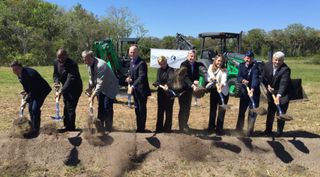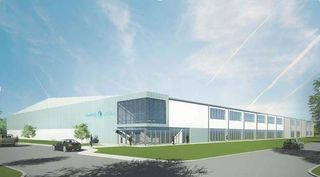OneWeb Breaks Ground on a Florida Factory That Will Build Thousands of Satellites

WASHINGTON — OneWeb Satellites, the joint venture between rising satellite operator OneWeb and manufacturing giant Airbus, broke ground March 16 on a dedicated factory that will build thousands of OneWeb satellites instead of the hundreds originally envisioned.
OneWeb Satellites Chief Executive Brian Holz said the $85 million Exploration Park, Florida, facility — which is scheduled to open a year from now — will go above and beyond the initial 900-satellite contract OneWeb placed in January last year.
"We'll produce over 2,000 satellites largely to be flown in LEO, low-Earth orbit, to be a key kingpin in that architecture," Holz said during the ceremony. "That's going to allow us the foundation, with new automation techniques, to lower the cost of satellite delivery, and also shorten the schedules for our customer and create value that is not in the industry today."
OneWeb Founder Greg Wyler tipped his hand regarding OneWeb's bigger constellation plan in February, telling an audience in London and later affirming to SpaceNews that the company was actively weighing about 2,000 satellites on top of the initially announced 648. Since then, OneWeb has described its initial "gen-1" constellation as 882 satellites, and filed with the U.S. Federal Communications Commission for permission to serve the U.S. market with 2,000 more satellites split between LEO and medium-Earth orbit.
OneWeb Satellites claims the Florida factory will be able to produce up to three satellites per day. In a March 16 interview with SpaceNews, Mike Cosentino, president of Airbus Defense and Space Inc., expressed confidence that the joint venture will be able to meet this production rate.
"Once we have the manufacturing processes down, once we have the suppliers lined up and the schedule validated, then we will operate in the same fashion as any high-assembly product does. It hasn't happened with a satellite, but there is no reason we can't do it with a satellite if you do it with airplanes and automobiles," he said.

The first 10 satellites for the overall constellation are planned for construction at an Airbus facility in Toulouse, France. Cosentino said reaching the three-a-day production rate is just as much about the design of the satellites as it is the factory. OneWeb Satellites will validate the production methods in Toulouse and replicate the process in Florida. Each spacecraft will be about the size of a washing machine, he said.
Get the Space.com Newsletter
Breaking space news, the latest updates on rocket launches, skywatching events and more!
OneWeb Satellites' Florida factory, like Blue Origin's launcher factory, is being built just outside the gates of NASA's Kennedy Space Center. In a March 16 statement, Wyler said the facility will enable OneWeb "to continuously iterate on the design of our satellites, launch new satellites within hours of completion and create significant opportunity in the U.S."
Most of OneWeb's spacecraft are contracted to launch on Arianespace-provided Europeanized Soyuz rockets, but some will launch on two rockets still in development: Virgin Orbit's LauncherOne air-launch system and Blue Origin's reusable New Glenn rocket.
OneWeb Satellites' main customer is OneWeb, but the company is not exclusively bound to build satellites for OneWeb alone. The company said it could be ready to build satellites for commercial and government customers in 2018. OneWeb's first-generation constellation is expected to start launches that year.
Not including subcontractors, OneWeb Satellites anticipates the Florida factory will create around 250 new jobs, bringing employment opportunities to a region still feeling the effects of the 2011 shutdown of NASA space shuttle program. The company expects to create thousands of more jobs — though not all in Florida — through its supplier base. Many of those suppliers are likely to set up locations of their own in Florida to keep pace with OneWeb Satellites' demand. Holz said component manufacturer Ruag Space, based in Switzerland, is bringing about 50 jobs to Florida related to OneWeb.
Holz said OneWeb Satellites will provide connectivity to a school in Brevard County, Florida, linking the academic institution with another school in Toulouse as a recognition of the company's vision of connecting 2 million schools around the world. Once OneWeb's own satellites are in orbit, he said the connection would switch to using that system.
OneWeb has the goal of bridging the digital divide by 2025, and has affirmed that goal has not changed with its pending merger with global geostationary satellite operator Intelsat.
This story was provided by SpaceNews, dedicated to covering all aspects of the space industry.
Join our Space Forums to keep talking space on the latest missions, night sky and more! And if you have a news tip, correction or comment, let us know at: community@space.com.
Caleb Henry is a senior analyst for Quilty Analytics and a former staff writer for the space industry publication SpaceNews. From 2016 to 2020, Caleb covered the global satellite industry for SpaceNews, chronicling everything from launches, spacecraft manufacturing and ground infrastructure. Caleb's work has also appeared in NewSpace Global and Access Intelligence. He earned a bachelor's degree in political science with a minor in astronomy from Grove City College.

